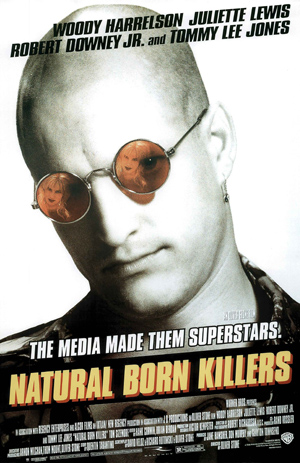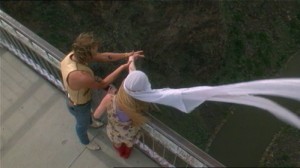
Natural Born Killers and the Media Violence Debate

Oliver Stone is one of the more innovative and interesting film-makers working within the Hollywood system. He combines a fascination with violence with an innate understanding of how the moving image can shock and affect audiences, particularly when the image is manipulated through skilful editing. Some of his best films count as some of the best films of all time (at least IMHO) - with Salvador, Platoon and JFK at the top of the list. Despite the range and depth of his body of work, his name remains synonymous with Natural Born Killers, a film notorious for both its content and its effect. It is still cited in murder cases as the trigger for teenage killing sprees, and is mentioned in dispatches whenever Hollywood is criticised for its levels of violence. Not all of the criticism is unfair, but many of the people who foam at the mouth when it is mentioned have never actually seen it.
Stone has dealt with many sorts of screen violence in his career. He has dealt movingly and on many different levels with the violence of war, and helped change the way the Vietnam war was represented with his trilogy Platoon (1986), Born On The Fourth of July (1989) and Heaven on Earth (1993). Each film examines the violence of war from a different perspective - troops in battle in Platoon, a veteran coming to terms with disability as the aftermath of violence in Born On The Fourth... and, uniquely for an American film, from the perspective of a young Vietnamese villager in Heaven & Earth. Stone's films all have a political dimension, and his war films manage to mesh the political and the personal, showing individuals trapped within a system which is about to do them harm in the name of 'the greater good' (a theme reiterated in Salvador and, of course, JFK). These films are intelligent texts made for an adult audience, and the violence they depict simply serves to repeat that old Miltonic lament against 'man's inhumanity to man'.
However, NBK is a satire, with its lairy soundtrack, hack'n'slash editing and appropriation of then-youth icon Tarantino's script, it seems aimed squarely at the 15-25 year old butt-rock-kick-ass-we-need-more-guns market, who whooped and cheered Mickey and Mallory's antics and missed the point completely. Stone has always been a risk-taker, and that gives him the edge as an artist, but surely the only risk attached to gratuitous violence and sitcom pastiches is the risk of ridicule? Stone has always aimed for originality in his work, and NBK is the very unoriginal remake of the seminal Badlands (1973).
Given the way these things work, the way NBK ended up has probably more to do with the studio than Stone, in the way the film was hyped pre-release and in the marketing (tagline: "The media made them superstars"). It was an odd choice for Stone to make, given his three Oscars and numerous nominations, and his career suffered.
- Oliver Stone — All You Need To Know by Jason O'Brien
- Natural Born Brawler — Salon.com interview with Stone
"volcanically violent" — Rolling Stone
"at least seven instances of consumption of beer" - CAP
Synopsis
Mallory (Juliette Lewis) is the abused teenage daughter of the family from hell. Mickey (Woody Harrelson) is the butcher's boy. Love is instant and inevitable, even if it means slaughtering Mallory's relatives and splattering a bloody trail of killings-for-kicks across the white trash heartlands. Their modus operandi involves leaving one survivor of each crime scene to tell the tale, and soon the media are on their trail, led by the oleaginous Wayne Gale (Robert Downey Jr, giving much needed humour to the proceedings). The young lovers become global superstars, and their notoriety is only inflamed by their capture and incarceration at the hands of prison boss Dwight Mcluskey (Tommy Lee Jones) who seems more hungry for media exposure than they are. Of course it all ends in tears, but not before Mickey has a primetime moment of pure epiphany ( "I realized my true calling in life... Shit, man, I'm a natural born killer") and Wayne Gale gets his.
- Critical round up at Rotten Tomatoes
- Detailed dissection of the director's cut from Kamera.co.uk
The Script
...was the subject of much controversy. It was written by Quentin Tarantino, but Stone hacked it about and made changes that Tarantino was unhappy with. Therefore Tarantino, whose Pulp Fiction (released in the same year) was acclaimed as far superior to NBK, is only credited with "story by". He actually wanted his name taken off the movie altogether, he hated it so much.
- read Tarantino's original version here
- Read the final
draft, credited to Tarantino, David Veloz, Richard Rutowski and Oliver Stone,
here. - Oliver Stone On Trial - for what he did to the original script. By Jim Emerson
The Impact
The film outraged large sections of the public, and wasn't particularly liked by anyone (unlike Pulp Fiction, for instance) except the psychopathic teenagers who later went on to blame it for their actions. Warner Bros hated it, and have had nothing to do with the recently released 'Director's Cut'. The Childcare Action Project list the reasons why you should hate it too (my favourite reason is "sexual vulgarity is as thick as tree sap"). However, there are a lot of movies out there that people don't like - where NBK is different is the explicit link that has been made between the text and the behaviour of people who watched it, especially in people who watched it repeatedly. Time and again, the portrayal of Mickey and Mallory as some sort of folk heroes has been criticised for sending the wrong messages. Unfortunately, the young people who idolise the characters don't just dress and talk like them, they go out on the road and kill like them too.
- Rising Body Count - Salon.com 1997
- Natural Born Copycats - Stone defends his film to The Guardian, December 2002
The Lawsuits
On March 5 1995, Sarah Edmonson and Ben Darrus spent the night watching Natural Born Killers on video and taking lots of acid. They apparently fantasised about aping the protagonists and going on their own killing spree. Two days later, Darrus shot and killed cottonmill worker Bill Savage. Edmonson shot store cashier Patsy Byers. They were sentenced to 35 years in jail.
Who is to blame? The teenagers themselves? The fact that they had ready access to guns? The film-makers? it seems we've been here before... However, the relatives of Patsy Byers decided to sue Stone for allegedly inciting "imminent lawless activity" with his film
- Louisiana
- Verdict on Louisiana (BBC News Report)
- FreedomForum's Timeline of NBK-Louisiana connections
- Essay In Defense of Oliver Stone
- Natural Born Copycat Killers - The Washington University Law Quarterly on the concept of Shock Torts
The Verdict
Natural Born Killers is, indeed, a violent film. Its central characters are loathesome and amoral, but are inconsistently represented. And I think this is the key to the problematic nature of the film: Mickey and Mallory are too sexy.
Stone doesn't want us to like them (they kill people) but he doesn't want us to entirely hate them (they had unhappy home lives. They are sorry for killing the Indian. They really love each other). They are represented as pure downhomegarbage, part of a lost generation whose only education comes from watching TV, with the result that their only ambition is to appear on it. Yet these characters are played by two young, fit, well-fed and well exercised Hollywood stars whose appearance is so pleasing they have been able to make millions of dollars out of it. They are consistently represented as stylish, wearing glamorous, sensual clothing, cinematographed against the vistas of the Old West, driving off into that mythical space where freedom is the top down and the radio up. And thus the main bite of the satire is lost. If Mickey and Mallory had been played by two actors who'd fallen off the ugly tree, then their rise to media superstardom would have been more biting, would have mocked the audience more, would have made the Wayne Gale 'exclusive' seem even more desperate. But no, we have two hot young stars who pledge their love for one another in a sincere and romantic way, atop a bridge over a canyon:

In this morass of images, sounds, colours and general confusion, Mickey and Mallory seem to be the only things of substance to cling to. They are the youngest, most attractive characters, and Hollywood has long taught us that these are the people we should trust and respect. Although they are absolutely amoral, they are not any worse than Mcluskey. Or Gale. What they are is better dressed and better explained, so it is no wonder we treat them as heroes.
I don't believe one film can be blamed for the actions of individuals whose moral sense is so warped and whose homicidal tendencies are already so honed that they would even consider doing any of this shit for real. However, given that morals and tendencies develop over a period of time, and that these individuals had been exposed to the putrid output of the big movie studios for all their time on this planet, I think that some blame can be apportioned. But just who exactly do you sue?
Further reading
- Natural Born Killers: A Postmodern Analysis - Michael Weinberger
- Representation of Violence in NBK - an essay
©Karina Wilson 2003